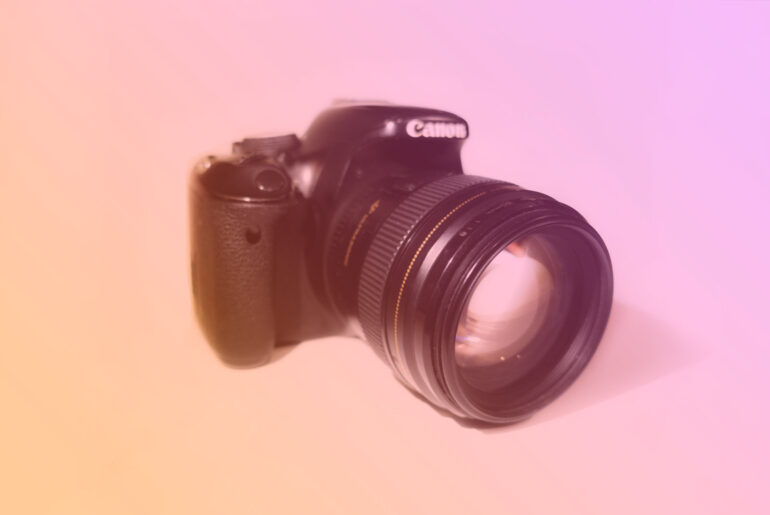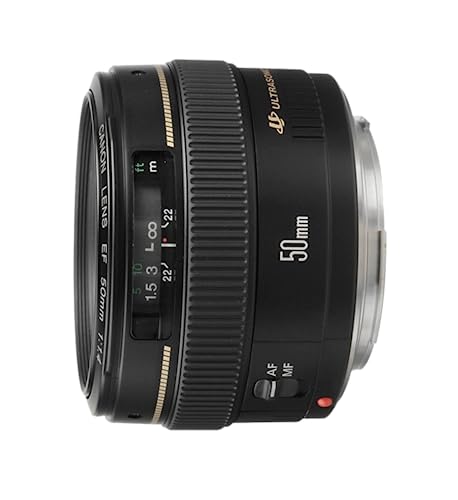We may earn a commission when you purchase through affiliate links. Learn more.
If you’re reading this guide, there’s probably one thing you’ve already realized — Canon DSLR lenses can be expensive. Really, really expensive. There’s an awful lot of fancy gadgetry and glass crammed into the body of a good lens that drives the price way up, but luckily there are some excellent lenses available at affordable prices and we’ll take a look at some of the best budget options in this buying guide.
The majority of beginner photographers who go with Canon as their DSLR system of choice buy their camera as part of a kit that includes a basic lens, usually the Canon EF-S 18-55 f/3.5–5.6, a perfectly capable lens, but one that lots of camera users find isn’t enough to meet all of their needs. Thus begins the search for good, cheap lenses that you won’t need to sell your car in order to afford. We’ve set an arbitrary upper limit of $500 for this buying guide because for most folks who aren’t pros anything over that would be pretty crazy. Many of the lenses we’ll show you below come in at well below $500, with some priced at under $300 and even a few that are under $200.
Canon DSLR lenses fall into two basic categories: EF lenses and EF-S lenses. EF lenses are designed with full frame cameras like the Canon 5D IV and Canon 6D II in mind – the larger sensors these cameras use mean that the lenses full field of view can be utilized by the lenses bigger image circle. Because the EF lenses are designed to be used with larger full frame sensors, that means they’re cross-compatible with cameras that use the smaller APS-C sensors as well making them the most future-proof choice for photographers who think they might upgrade to a full frame camera at some point
EF-S lenses are designed with Canon’s APS-C sensor cameras like the Canon T6i, Canon 7D II, and Canon 80D in mind. Because APS-C sized sensors are smaller than full frame sensors, these lenses don’t need an image circle as large as that found on an EF lens – EF-S lenses are generally lighter, smaller, and cheaper than EF lenses, but they can’t be used with full frame cameras.
Whether EF or EF-S is right for you is a very personal decision that only you can really answer. For most photographers, even many working pros, a full frame camera isn’t a necessity and these more affordable lenses are the perfect choice. If you do have the intention to upgrade to a full frame Canon camera at some point, keep that in mind when buying lenses.
Before we give you our recommendations of the best Canon lenses under $500, let’s quickly go over the concept of crop factor, a pretty confusing topic for lots of photographers. Let’s say you’ve got a 50mm lens: on a full frame camera like the Canon 5D IV, it functions as a 50mm lens because the sensor is able to make full use of the lens’s image circle. On a crop-frame camera with an APS-C size sensor like the Canon T6i, the smaller sensor offers a more limited field of view of the same scene, producing a crop factor of 1.6x.
Basically, when you use that same 50mm lens with a Canon DSLR with a crop-sensor, you can capture an image with the same field of view that an 80mm lens would give you if used with a full frame DSLR camera. If you’re still a little fuzzy on how all this works, don’t worry…it’s pretty confusing for everyone. We go into more detail in this guide.
Lenses come in an assortment of focal lengths, with each range being best suited for different subjects. In photography there are no rules that demand you use a particular focal length for only that one use, but you’ll usually get some of the best results if you keep this info in mind:
Ultra-wide to Wide: 10-35mm – these lenses allow photographers to capture an incredibly wide angle of view, making them well suited for landscape photography, real estate photography, and automotive photography.
Normal/Standard: 50mm – This focal length offers a perspective close to what the human eye sees. It’s a good length for full body portraits and general purpose photography.
Portrait: 85mm – The 85mm focal length is a favorite among portrait photographers.
Telephoto: 135mm+ The telephoto focal lengths are useful for photographers whose subjects are farther away like wildlife, birds, and sports. Many photographers also like using long telephotos for portraits as well.
Here are the best Canon lenses under $500, organized by focal length:
- EF S ultra wide zoom lens. Drive System Lead screw and rack system driven by stepping motor
- Focal Length and Maximum Aperture: 10 18 millimeter, 1:4.5; 5.6
- Closest Focusing Distance: 0.72 feet. ; 0.22 meter
- Stepping motor for noise free video shooting
Canon EF-S 10-18mm f/4.5-5.6 IS STM Lens
A popular lens among real estate and architectural photographers, the EF-S 10-18mm lens is a very cheap way to get great wide angle results for less than a third of the cost of a Canon 16-35mm f/4 L lens. The 10-18mm lens features built in optical image stabilization, offering up to 4 stops of shake correction, meaning you can use much slower shutter speeds when photographing in lower light while still obtaining sharp results.
- Wide angle lens for Canon APS C cameras (equivalent to 38 millimeter on a full frame camera)
- Focal length & maximum aperture: 24 millimeter 1:2.8, maximum magnification of x0.27
- Slimmest and lightest lens of the EF S series
- Circular aperture (7 blades) delivers beautiful, soft backgrounds
Canon EF-S 24mm f/2.8 STM Lens
This is Canon’s lightest, smallest EF-S lens and at 24mm (providing and equivalent focal length of 38mm) it’s a very affordable way to get into wide-angle photography. This is an excellent lens for numerous different types of shooting, from astrophotography to street photography.
- 50 millimeter focal length and maximum aperture of f/1.8
- Great for portraits, action, and nighttime photography; Angle of view (horizontal, vertical, diagonal):...
- Minimum focusing distance of 1.15 feet (0.35 meter) and a maximum magnification of 0.21x
- Stepping motor (STM) delivers near silent, continuous move Servo AF for movies and smooth AF for stills
Canon EF 50mm f/1.8 STM Lens
An incredibly affordable lens, the Canon EF 50mm f/1.8 STM lens is a must-have for just about every photographer. The 50mm focal length is incredibly useful – there’s a good reason 50mm lenses are known as nifty fifties! This lens produces sharp results, focuses quickly, and renders attractive bokeh when used wide open…there’s not much not to love about this lens. It’s constructed of plastic with a metal mount, but feels solid and is constructed well and weighs just 5.6 ounces.
- Standard focal length 50 millimeter lens is effective in a multitude of shooting situations and ideal for...
- Elements, Groups: 7 by 6, Diaphragm: Blades 8, Filter Thread: Font 58 millimeter. Minimum focusing...
- An f 1.4 maximum aperture provides clear imaging in low light situations and shallow depth of field
- Ultrasonic autofocus motor (USM) operation is fast, smooth and virtually silent
Canon EF 50mm f/1.4 USM
The Canon EF 50mm f/1.4 USM lens is a great lens with a faster maximum aperture than the 50mm f/1.8 STM lens listed above this, making it great for shooting in lower lighting conditions and rendering super creamy bokeh. The USM motor means it focuses very quickly and quietly, important attributes that make it a favorite among wedding photographers who can’t justify the very steep cost of the Canon EF 50mm F/1.2L USM lens.
- 60mm macro lens with f/2.8 maximum aperture for EOS digital SLR cameras
- 25-degree angle of view is equivalent to 96mm lens on 35mm camera
- Focal length : 60mm, Closest focusing distance : 0.65 feet
- Floating optical system can focus down to life-size 1:1 magnification
Canon EF-S 60mm f/2.8 Macro USM Lens
The EF-S 60mm f/2.8 Macro USM is an outstanding lens for photographers who want to capture extreme close-up images of small subjects like flowers, insects, and jewelry. This lens allows you to get as close as .65 feet from your subject and captures crisp detail. Even though most photographers buying this lens plan to use it for specialized macro photography, it can be used for photographing regular subjects too and does a great job. Since it’s an EF-S mount lens, it can only be used with APS-C sensor cameras.
- 85 millimetre standard lens with f 1.8 maximum aperture for Canon SLR cameras, Lens Type:Telephoto Zoom...
- Ring-type ultra-sonic monitor (USM) brings subject quickly into focus, Focal length: 85 millimetre,...
- Natural angle of view and perspective is ideal for portraits and natural images
- Designed to produce beautiful background blur; weighs 15 ounces
Canon EF 85mm f/1.8 USM
The Canon EF 85mm f/1.8 USM lens is widely regarded as one of Canon’s best lenses, producing some of the best bokeh around and rivaling the much more expensive Canon EF 85mm f/1.2 L lens in image quality. This is a well built lens that feels solid and focuses quickly and accurately. For portrait photographers and those searching for beautiful bokeh, this is one of the top lenses you can own.
- High magnification, compact and lightweight EF-S telephoto zoom lens with Image Stabilization for up to...
- One UD lens element reduces chromatic aberration throughout the zoom range, for excellent image quality...
- New six-group zoom system provides a compact design while achieving a maximum magnification of 0.29x at...
- Minimum focusing distance: 2.79 feet; 0.85 meter (full zoom range).
Canon EF-S 55-250mm F4-5.6 IS STM Lens
It’s tough to find good telephoto zoom lenses that deliver sharp results and don’t cost a fortune. Designed for crop sensor cameras, the EF-S 55-250mm F4-5.6 fits the bill and is a great lens for photographers who want a lens that can do a better job of filling up the frame with far away subjects.
Did you like this buying guide? Be our hero and give it a share on Pinterest!









